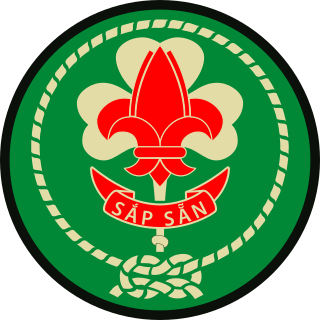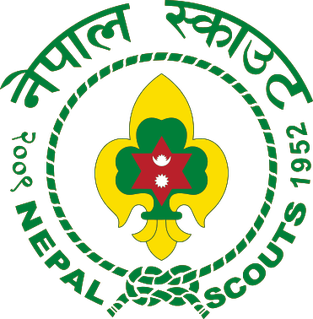
Scouting, also known as the Scout Movement, is a worldwide youth movement employing the Scout method, a program of informal education with an emphasis on practical outdoor activities, including camping, woodcraft, aquatics, hiking, backpacking, and sports. Another widely recognized movement characteristic is the Scout uniform, by intent hiding all differences of social standing in a country and making for equality, with neckerchief and campaign hat or comparable head wear. Distinctive uniform insignia include the fleur-de-lis and the trefoil, as well as merit badges and other patches.

The Boy Scouts of the Philippines (BSP) is the national scouting organization of the Philippines in the World Organization of the Scout Movement. The Scout movement was first introduced in the Philippines on 1910 during the American Colonial Rule. It was "granted Recognition as a Member Organisation of the Boy Scouts International Conference...with effect from October 31, 1936" by virtue of certification signed by J. S. Wilson, Olave Baden-Powell, and Daniel Spry.

Cub Scouts, Cubs or Wolf Cubs are programs associated with Scouting for young children usually between 7 and 12, depending on the organization to which they belong. A participant in the program is called a Cub. A group of Cubs is called a 'Pack'.
Scouts South Africa is the World Organization of the Scout Movement (WOSM) recognised Scout association in South Africa. Scouting began in the United Kingdom in 1907 through the efforts of Robert Baden-Powell and rapidly spread to South Africa, with the first Scout troops appearing in 1908. South Africa has contributed many traditions and symbols to World Scouting.

Rover Scouts, Rovers, Rover Scouting or Rovering is a program associated with some Scouting organizations for adult men and women. A group of Rovers is called a 'Rover Crew'.
Scouting and Guiding in Mainland China was reported as banned with the establishment of the People's Republic of China (PRC) by the Communist Party since 1949. Instead, the Young Pioneers of China and the Communist Youth League, led by the Communist Party, have become the dominant youth organization in mainland China for younger and older youth, respectively. However, China now has multiple and originally separate Scouting activities within its borders. In 2004, the Scout Club of Hainan (海南童子军俱乐部), borrowing heavily from Scouting in terms of emblems, uniforms and activities, was founded in Hainan Province; it is, however, not affiliated with worldwide Scouting. An attempt to organize a nationwide Scouting organization in Wuhan was ended by the government in 2004. The Scout Association of the People's Republic of China (中华人民共和国童军总会), founded in 2008 serves Venture Scouts in both genders as well as Rover Scouts. The Rover Explorer Service Association operate groups in China.

The Vietnamese Scout Association is a youth organization that was established in Vietnam and active between 1930 and 1975. The association was recognized by the World Organization of the Scout Movement from 1957 to 1975.

The Bharat Scouts and Guides (BSG) is the national Scouting and Guiding association of India. The national headquarters of BSG is recognised by the Government of India.

The "Nepal Scouts" is the national Scouting and Guiding organization of Nepal, founded in Nepal in 1952. It became a member of the World Organization of the Scout Movement in 1969 and later became a member of the World Association of Girl Guides and Girl Scouts in 1984.
Traditional Scouting is "old-fashioned" or "back to basics" Scouting in some form, often with an emphasis on woodcraft and scoutcraft activities. As a decentralized movement, there is no one set definition for the term, but most groups do share a generally agreed-upon basic set of values and procedures. The Traditional Scouting movement aims to return Scouting to something approximating its original style and activities; rejecting the trend of modernizing the program in an attempt to widen its appeal.
Beavers is a program associated with some Scouting organizations generally for children aged 6 to 8 who are too young for the Cub program.
Non-aligned Scouting organizations is a term used by the World Organization of the Scout Movement (WOSM), World Association of Girl Guides and Girl Scouts (WAGGGS) and their member national organizations to refer to Scouting organizations that are not affiliated with them. See List of non-aligned Scouting organizations.
Scouting has sometimes become entangled in social controversies such as in nationalist resistance movements in India. Scouting was introduced to Africa by British officials as an instrument of colonial authority but became a subversive challenge to the legitimacy of British imperialism as Scouting fostered solidarity amongst African Scouts. There are also controversies and challenges within the Scout Movement itself such as current efforts to turn Scouts Canada into a democratic organization.
The Scout and Guide movement in Australia consists of
The Scout and Guide movement in Malta is served by three organizations:
The Scout and Guide movement in Japan is served by
Scouting and Guiding in the United Kingdom is served by several different organisations:
Scouting activities in the Philippines have been promoted by various organizations: the YMCA, the Boy Scouts of America, the Camp Fire Girls, the Boy Scouts of the Philippines, the Girl Scouts of the Philippines, and the Boy Scouts of China.

The Outdoor Service Guides (OSG) is an inclusive, co-ed scouting organization in the United States. It accepts scouts without regard to gender, gender identity, race, sexual orientation, economic circumstances, religion, or other differentiating factors. The OSG is a member of the World Federation of Independent Scouts (WFIS).








